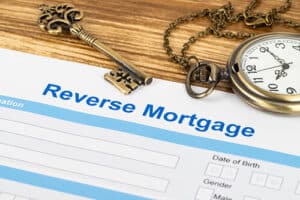Unlocking Your Home’s Value: A Complete Guide to Reverse Mortgages for New Jersey Seniors
Thinking about how to best utilize your home equity in retirement? A reverse mortgage could be an option to consider.

Reverse mortgages are a method of getting liquid cash by taking loans out against the equity of your home. These specific types of mortgages are reserved for older homeowners who would like to enhance their retirement, either making retirement possible or allowing more financial freedom.
Can Anyone Get a Reverse Mortgage in NJ?
The reverse mortgage has an application process that is identical to that of a regular mortgage as if you were buying a home. However, there is an age requirement of 62 years old. The borrower must also being living at the home, or residence, as the principal residence. The home being used for the reverse mortgage has to be owned outright or there must be a significant amount of equity in the home. Also, the borrower cannot be in delinquent status for any federal debt. Lastly, the borrower must undergo counseling sessions as mandated by the US Department of Housing and Urban Development.
Deciding if a Reverse Mortgage is a Good or Bad Idea in Your Case
A reverse mortgage can be very enticing to older homeowners. The reverse mortgage can allow for a surge of liquid cash without losing ownership or the deed to the home you are using for the reverse mortgage. The loan, which can be a lump sum, fixed monthly payments, or a line of credit, is only repaid if you move, sell, or pass away.
However, all of your obligations that you had before the reverse mortgage, such as property taxes and insurance, must still be paid monthly. Despite not making monthly payments on the reverse mortgage, the interest on the reverse mortgage still accrues and must be paid when the loan is due. Another disadvantage of the loan can be a diminished inheritance for those beneficiaries in your estate.
Even though reverse mortgages can be extremely beneficial to those nearing retirement age, there are some considerations that should be thought about before making the decision to apply. For example, the timeline of a reverse mortgage must be carefully considered. Depending on how long interest accumulates, equity might decrease on the home, and there could be less money available for either inheritance for beneficiaries or medical care options as the borrower advances in age. Despite not having to make monthly payments, the borrower must avoid foreclosure still by complying with all property tax payments, insurance payments and other maintenance.
Comparing a Reverse Mortgage to a Standard Mortgage
Standard mortgages are traditional loans in which the borrower must make monthly payments towards the balance and interest of the loan. These payments go towards the equity of the home and the homeowner invests more and more into the home that they have taken the mortgage out for. Usually the mortgage is used to acquire the home and if payments are not made, the home can go to the bank in which the mortgage originated.
Reverse mortgages do not require the borrower to make monthly payments. The borrower can pay as often as they would like, or they can pay the balance when they move or sell the home, or if they die. The homeowner retains ownership of the home but accumulating interest may decrease the equity of the home. This is why it is essential to obtain the right attorney to help guide you through the process and to see if this is the right option for you.
Common Reasons People Choose Reverse Mortgages
A reverse mortgage does not impact the ownership of a home whatsoever. Many people prefer a reverse mortgage over a traditional mortgage for this very reason. Payment options are also entirely up to the borrower in that they can choose to make monthly payments, or pay at their leisure. As long as the terms of the loan are being met, the borrower retains the title and deed to their home as they enjoy the proceeds of the loan. There aren’t many loans like this. If the home has enough equity in it, or the home is owned outright, a borrower can enjoy a maximum loan amount of up to $1,149,825. A reverse mortgage is often a perfect option for those whose net worth is primarily in their residence, who are unable to move, who need funds but cannot afford monthly payments, and who do not qualify for a Home Equity Line of Credit (HELOC) or the like.
Main Kinds of Reverse Mortgages for New Jersey Homeowners

The other kind of reverse mortgage available in New Jersey is a Proprietary Reverse Mortgage (PRM). A PRM is not federally backed and insured by the FHA, which means there are no federal regulations or guidelines. This is a private loan that allows for higher loan amounts, which can make this a more attractive option.
Before You Choose a Reverse Mortgage, Consider These Alternatives
If you had alternatives to a reverse mortgage, they would look like this. You could sell your home, and downgrade your living arrangements and lifestyle for a surge of cash. You could withdraw money from any retirement accounts or investment accounts. There are also other loans you could take out against the equity of your home, such as a home equity loan or HELOC, but these require monthly payments and you could lose ownership of your home. Lastly, you could refinance your home with another mortgage to access funds immediately, however you could still lose your home if payments are not made.
Wondering How To Address A Reverse Mortgage for Your NJ Home? Contact An Experienced Sea Bright NJ Real Estate Attorney Today
The right attorney needs to be consulted before applying and deciding to proceed with a reverse mortgage. An experienced lawyer at The Bronzino Law Firm can discuss the benefits, disadvantages and considerations to be taken into account during a free consultation. We can discuss with you important aspects such as your future, the money that will be available, and what could possibly happen if you do not meet the terms of your loan. In order to protect your interests and your family’s interests, hire an attorney who is seasoned in this very unique area of the law. With over 14 years of experience handling legal matters involving real estate and mortgages on behalf of clients in Sea Bright, Toms River, Brick, Beachwood, Neptune, Howell, Brielle, Island Heights and across Ocean and Monmouth County, our real estate attorneys are poised to answer your questions and provide the representation you need to ensure a smooth, successful process. Contact us today at (732) 812-3102







